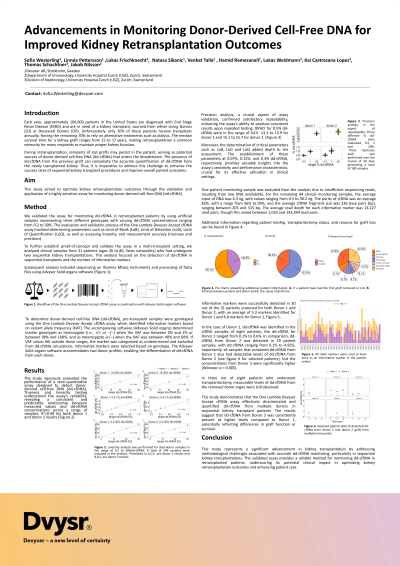P716: Advancements in monitoring donor-derived cell-free DNA for improved kidney retransplantation outcomes
(P716) Advancements in monitoring donor-derived cell-free DNA for improved kidney retransplantation outcomes

Poster Presenter(s)
Aim: This study aims to optimize kidney retransplantation outcomes through the validation and application of a highly sensitive assay for monitoring donor-derived cell-free DNA (dd-cfDNA).
Method: We validated the assay for monitoring dd-cfDNA in retransplanted patients by using artificial samples representing three different genotypes with varying dd-cfDNA concentrations ranging from 0.2 to 30%. The evaluation and validation process of the One Lambda Devyser Accept cfDNA assay involved determining parameters such as Limit of Blank (LoB), Limit of Detection (LoD), Limit of Quantification (LoQ), as well as assessing linearity, and measurement accuracy (trueness and precision).
We further explored the precision of identifying the origin of detected donor-derived cell-free DNA (dd-cfDNA) using clinical samples obtained from 31 patients who had undergone two sequential kidney transplantations.
Subsequent analysis included sequencing on Illumina MiSeq instruments and processing of fastq files using Advyser Solid Organs software.
Results: Through the assessment of various performance metrics such as LoB, LoD, LoQ, linearity, and measurement accuracy (trueness and precision), the assay exhibited consistent and reliable performance across a spectrum of dd-cfDNA concentrations.
Dd-cfDNA was detected from both the initial transplanted (non-functioning) graft and the functioning graft in a subset of patients. Specifically, dd-cfDNA originating from the initial graft was observed in 20% of patients, with levels consistently ranging from 0.1% to 0.6%. This observation suggests a potential persistence of donor genetic material even after graft failure. Intriguingly, sequential sample analyses unveiled temporal fluctuations in dd-cfDNA levels, indicating dynamic changes over time. Moreover, dd-cfDNA from the functioning graft was detected in the remaining patients, highlighting variations within a clinically relevant range.
Conclusion: This study represents a significant advancement in kidney transplantation by addressing methodological challenges associated with accurate dd-cfDNA monitoring, particularly in sequential kidney transplantations. The validated assay provides a reliable method for monitoring dd-cfDNA in retransplanted patients, underscoring its potential clinical impact in optimizing kidney retransplantation outcomes and enhancing patient care.
Method: We validated the assay for monitoring dd-cfDNA in retransplanted patients by using artificial samples representing three different genotypes with varying dd-cfDNA concentrations ranging from 0.2 to 30%. The evaluation and validation process of the One Lambda Devyser Accept cfDNA assay involved determining parameters such as Limit of Blank (LoB), Limit of Detection (LoD), Limit of Quantification (LoQ), as well as assessing linearity, and measurement accuracy (trueness and precision).
We further explored the precision of identifying the origin of detected donor-derived cell-free DNA (dd-cfDNA) using clinical samples obtained from 31 patients who had undergone two sequential kidney transplantations.
Subsequent analysis included sequencing on Illumina MiSeq instruments and processing of fastq files using Advyser Solid Organs software.
Results: Through the assessment of various performance metrics such as LoB, LoD, LoQ, linearity, and measurement accuracy (trueness and precision), the assay exhibited consistent and reliable performance across a spectrum of dd-cfDNA concentrations.
Dd-cfDNA was detected from both the initial transplanted (non-functioning) graft and the functioning graft in a subset of patients. Specifically, dd-cfDNA originating from the initial graft was observed in 20% of patients, with levels consistently ranging from 0.1% to 0.6%. This observation suggests a potential persistence of donor genetic material even after graft failure. Intriguingly, sequential sample analyses unveiled temporal fluctuations in dd-cfDNA levels, indicating dynamic changes over time. Moreover, dd-cfDNA from the functioning graft was detected in the remaining patients, highlighting variations within a clinically relevant range.
Conclusion: This study represents a significant advancement in kidney transplantation by addressing methodological challenges associated with accurate dd-cfDNA monitoring, particularly in sequential kidney transplantations. The validated assay provides a reliable method for monitoring dd-cfDNA in retransplanted patients, underscoring its potential clinical impact in optimizing kidney retransplantation outcomes and enhancing patient care.

